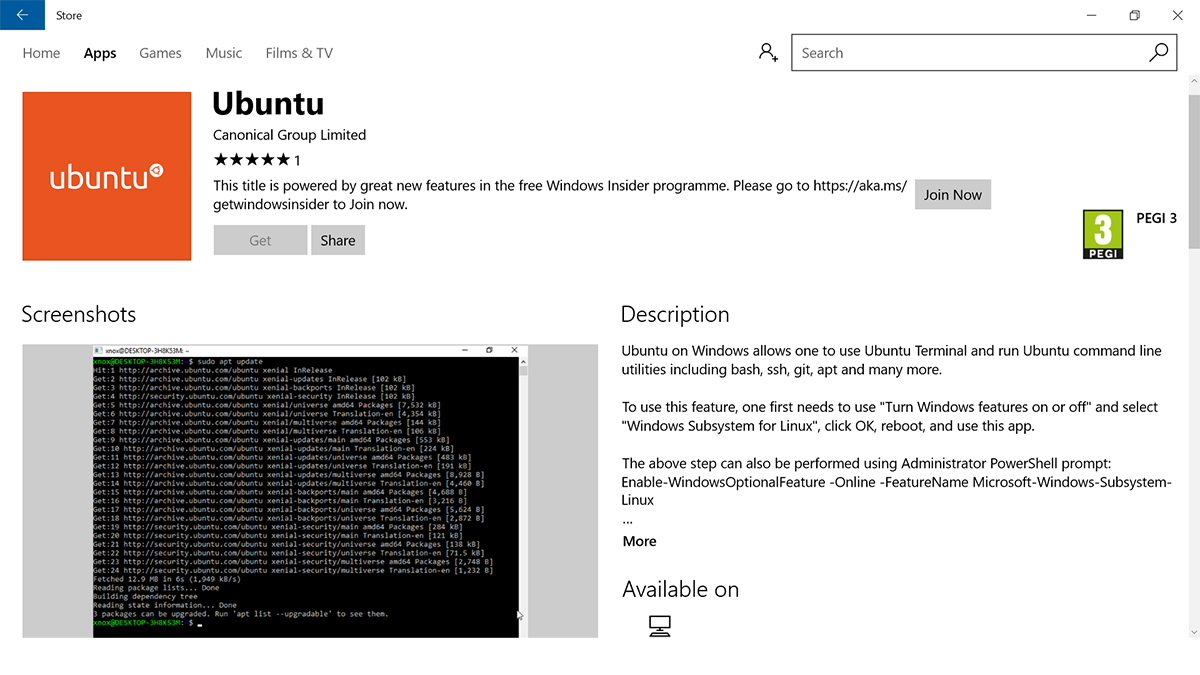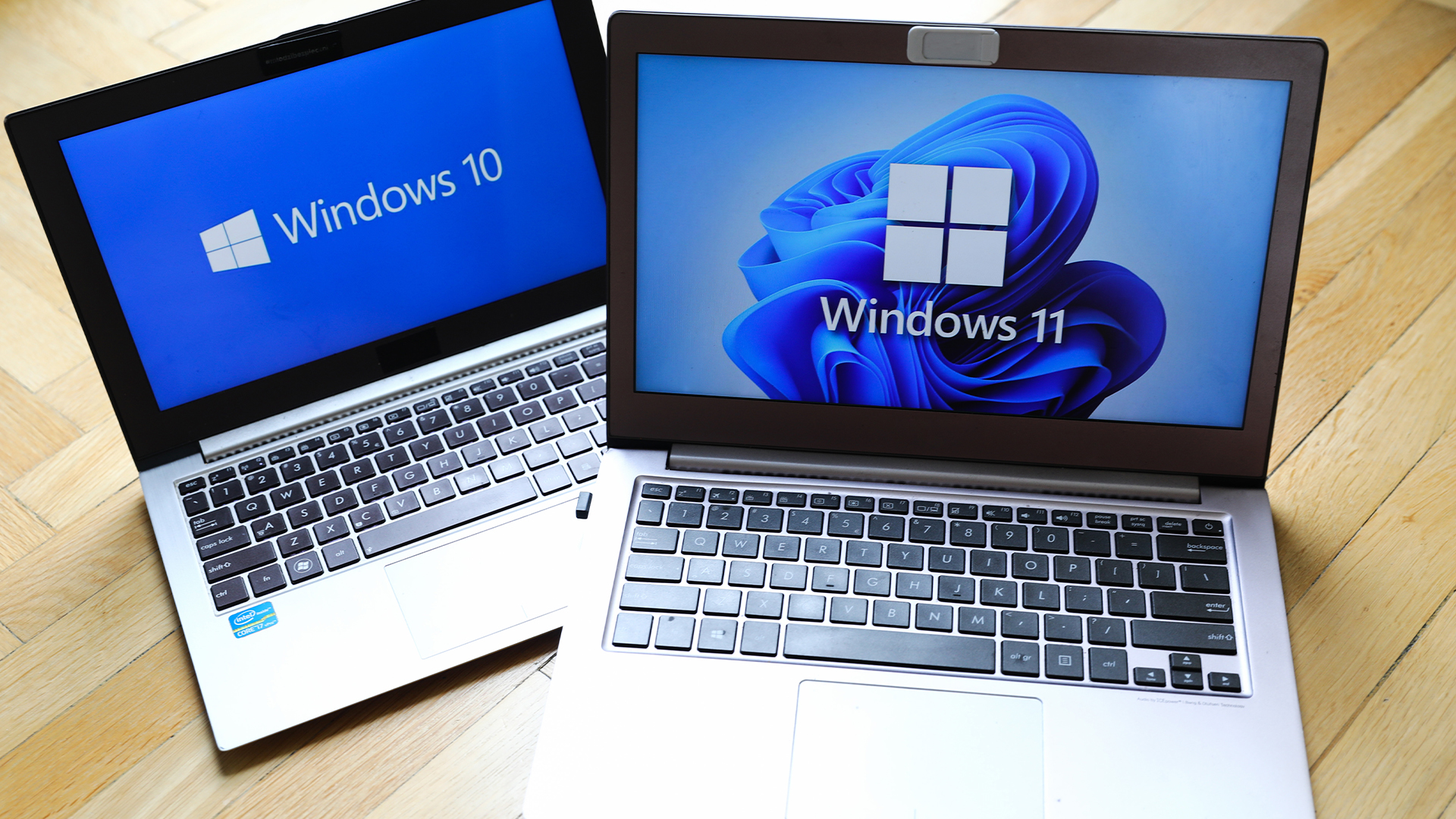Linux news: Ubuntu now available on the Windows Store
Microsoft brings Linux OS to its storefront


Sign up today and you will receive a free copy of our Future Focus 2025 report - the leading guidance on AI, cybersecurity and other IT challenges as per 700+ senior executives
You are now subscribed
Your newsletter sign-up was successful
Open-source operating system Ubuntu is now available to download and install from the Windows Store, Microsoft has announced.
The Linux-based OS is available to download and install for anyone on Windows Insider build 16215 and above, and will shortly be rolling out to all users running the Fall Creators Update.
Rather than the full desktop Ubuntu image, complete with Ubuntu's graphical user interface, this method of installation allows developers to run Ubuntu's terminal and command line utilities, such as bash, git and ssh.
This means developers can launch Linux from Windows' existing command prompt and Powershell tools, and it hugely important for developers. Rather than needing to spin up a Linux image in a VM, devs can script and test their Linux code natively within Windows 10.
SUSE and Fedora will also be bringing their Linux distros to the Windows store in the coming weeks, and when multiple distros are available, users will be able to install and run them side-by-side.
"We would like to extend our sincerest thanks to the great teams at Canonical, SUSE and Fedora for all their patience, hard work & support as we worked together to plan, build & publish their distro packages in the Windows Store," said Microsoft senior project manager Rich Turner in a blog post announcing the change.
Windows Server 2016, the company's server-side counterpart to Windows 10, will also be made compatible with Windows Subsystem for Linux the compatibility layer that allows Linux to run on Windows later this year.
Sign up today and you will receive a free copy of our Future Focus 2025 report - the leading guidance on AI, cybersecurity and other IT challenges as per 700+ senior executives
Microsoft is making a big push to embrace Linux users; last year, it launched the cross-platform .NET Core framework at a Linux conference, expanded support for Linux distros on its Azure cloud platform and enabled native Linux workloads and containers on Windows Server.
15/03/2017: Munich IT head says no reason to return to Windows
Munich's head of IT has blasted the city's decision to switch back to Windows from Linux, stating that there are no "compelling technical reasons" to make the change.
For the past nine years, Munich has been running its public sector It on Linux-based workstations, but the city recently moved to end this program. A recent report indicated that the decision was based on compatibility issues caused by the Linux client and LibreOffice productivity suite, as well as higher OpEx costs than anticipated.
Karl-Heinz Schneider, head of the the city's IT service provider IT@M, told German industry publication Heise.de that the decision came as a shock. "We solve compatibility and interoperability problems by providing MS Office, mostly virtualised, at workplaces that need to work together with external offices on office documents," he said.
He also claimed that any IT failures were not down to LiMux (the specific Linux variant built by IT@M), but down to the fragmented nature of the city's IT setup, where control is divided between IT@M as well as local authority IT departments.
Munich politicians disagree, however. CSDU party member Kristina Frank said at a recent meeting ahead of a council vote on LiMux's fate that "most workplaces in Germany and worldwide are running other clients. Linux may be the right choice for many users but it's not for Munich".
"Our LiMux client fundamentally works but it's not efficient or intuitive and there are regular problems when you have to add other software, regular compatibility problems."
Adam Shepherd has been a technology journalist since 2015, covering everything from cloud storage and security, to smartphones and servers. Over the course of his career, he’s seen the spread of 5G, the growing ubiquity of wireless devices, and the start of the connected revolution. He’s also been to more trade shows and technology conferences than he cares to count.
Adam is an avid follower of the latest hardware innovations, and he is never happier than when tinkering with complex network configurations, or exploring a new Linux distro. He was also previously a co-host on the ITPro Podcast, where he was often found ranting about his love of strange gadgets, his disdain for Windows Mobile, and everything in between.
You can find Adam tweeting about enterprise technology (or more often bad jokes) @AdamShepherUK.
-
 ITPro Best of Show NAB 2026 awards now open for entries
ITPro Best of Show NAB 2026 awards now open for entriesThe awards are a fantastic opportunity for companies to stand out at one of the industry's most attended shows
-
 Mistral CEO Arthur Mensch thinks 50% of SaaS solutions could be supplanted by AI
Mistral CEO Arthur Mensch thinks 50% of SaaS solutions could be supplanted by AINews Mensch’s comments come amidst rising concerns about the impact of AI on traditional software
-
 Windows 10 extended support costs could top $7 billion
Windows 10 extended support costs could top $7 billionNews Enterprises sticking with Windows 10 after the October deadline face huge costs
-
 Tiny11 review: Windows 11 with only 2GB of RAM
Tiny11 review: Windows 11 with only 2GB of RAMReview A version of Windows 11 for older machines that don't meet the full requirements
-
 Red Hat Enterprise Linux becomes foundational operating system for Cohesity Data Cloud
Red Hat Enterprise Linux becomes foundational operating system for Cohesity Data CloudNews New strategic partnership between Red Hat and Cohesity aims to drive innovation in the data security and management space
-
 Ubuntu shifts to four-week update cycle
Ubuntu shifts to four-week update cycleNews Critical fixes will also come every two weeks, mitigating the issues involved with releasing prompt patches on the old three-week cadence
-
 AlmaLinux follows Oracle in ditching RHEL compatibility
AlmaLinux follows Oracle in ditching RHEL compatibilityNews Application binary compatibility is now the aim with 1:1 now dropped
-
 How big is the Windows 10 cliff-edge?
How big is the Windows 10 cliff-edge?ITPro Network With some comparing the upcoming Windows 10 end of life to Windows XP, we ask members of the ITPro Network for their insight
-
 Everything you need to know about the latest Windows 11 updates - from bug fixes to brand-new features
Everything you need to know about the latest Windows 11 updates - from bug fixes to brand-new featuresNews Two new cumulative updates are on the way and will be installed automatically on Windows 10 and Windows 11 machines
-
 How to download a Windows 11 ISO file and perform a clean install
How to download a Windows 11 ISO file and perform a clean installTutorial Use a Windows 11 ISO to install the operating system afresh
